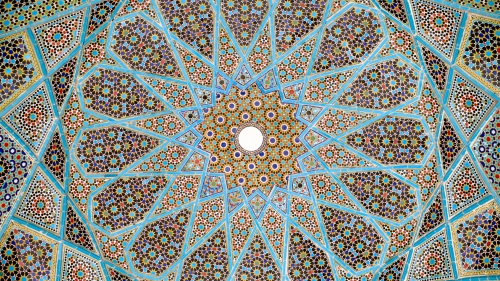How to Become God-Conscious (or Muttaqi)

“This is the Book; in it is guidance, without doubt, to those who fear God.” [Yusuf Ali].“This DIVINE WRIT – let there be no doubt about it – is [meant to be] a guidance for all the God-conscious.” [Muhammad Asad] Holy Qur’an (2:2)
Taqwaa (in Arabic) is normally translated as God-fearing or God-conscious, but the meaning of Taqwaa is much more expansive. Its full import cannot be understood until we fully grasp its root meaning in Arabic. The root of Taqwaa means to remain steadfast and vigilant in honoring Allah’s guidance and by means of that commitment seek protection from all that is evil, corrupt, and destructive in the world. The very cornerstone of Taqwaa is the cultivation of one’s strength of character made true by following the principles laid down by Allah in the Qur’an. Persons who strive to develop their character in accord with the Qur’anic ideal reflect this integrity in their actions and earn the bearing of Muttaqi in the eyes of Allah.
Many Muslims today who claim to fear God or claim to be God-conscious firmly believe that they are among the God-conscious based upon their performance of certain rituals. According to their belief, who amongst the following would qualify as God-conscious?
1. Would the rich, who pray regularly, fast the entire month of Ramadan, give the 2-1/2% charity from their wealth, and perform pilgrimage (Hajj or Umra) on a regular basis, qualify as God-conscious?
2. Would the current, self-acclaimed Muslim governments and the Muslims working for them qualify to be among the God-conscious?
3. Would leaders of various religious parties and their followers who demand governments to implement their established Shariah qualify as God-conscious?
4. Would professionals who initially work hard to build and establish careers and later turn to spiritual development activity and claim then to be pious Muslims qualify as God-conscious?
5. Would the Sufis/mystics who spend most of their adult life in dhikr (remembrance) of Allah and remain unconcerned with what goes on in the world outside, qualify as God-conscious?
6. Would those who leave behind the poor, the orphans, and the widows in their own communities and travel to far-off places inviting people to Islam, qualify?
7. Would the professional Imams who lead prayers in mosques and give sermons and lecture others about being God-conscious qualify as God-conscious?
8. How about those who carry the banner of spiritual development but are busy condemning those who disagree with them? Would they qualify?
9. What of the poor, the hungry, and the destitute who pray regularly and fast the month of Ramadan but cannot afford to perform the pilgrimage? Would they qualify as God-conscious? Think of the poor farmer who spends all his life tilling the soil and producing food for others and despite his labors in the scorching sun, perseveres to fast regularly. Would he qualify?
10. And what of the millions of average Muslims who struggle all their lives to meet the basic needs of their families and who try to pray and fast but do not have the time or resources for anything else? Would they qualify as God-conscious?
How many of the 1.6 billion or so Muslims fall into categories 1-8 and how many into categories 9-10? No doubt, 99% of Muslims fall into the latter. Would they be excluded from being considered as God-conscious because they cannot perform all of the five pillars?
The Qur’anic Definition of God-conscious
A very comprehensive definition of God-conscious is given in the following verse:
“It is not righteousness that ye turn your faces towards the east or West; but it is righteousness to believe in God and the Last Day, and the Angels, and the Book, and the Messengers; to spend of your substance, out of love for Him, for your kin, for orphans, for the needy, for the wayfarer, for those who ask, and for the ransom of slaves; to be steadfast in prayer, and practice regular charity; to fulfill the contracts which ye have made; and to be firm and patient, in pain (or suffering) and adversity, and throughout all periods of panic. Such are the people of truth, the God-fearing (God-conscious).” [Al-Baqarah 2:177, Translation: Yusuf Ali]
This verse puts into perspective the ritual-based Islam that we practice versus the substance and goal-based Islam, which the Prophet (PBUH) and his companions practiced. Proponents of the ritual-based Islam would have us believe that once the rituals are done properly, meticulously, and sincerely we are guaranteed salvation in the Hereafter. The Qur’an clearly rejects this view of Islam in the verse cited above. The Qur’an states that these people are misguided, have fabricated a Shariah, and have confused their rulings with the Book of Allah and erroneously proclaim such rulings to be Divine (2:176).
According to verse 2:177, the essential purpose of Islam is not fulfilled by a mechanical performance of rituals (e.g., turning eastward or westward during prayer), but requires instead:
1. 100% conviction, Iman, in Allah; in the law of requital; in the life Hereafter; in the forces created by Allah for our benefit, Malaa-ikaa; in all the Prophets (PBUT); and in all the Books revealed to them.
2. The establishment of a system in which resources are made available to help those who (a) are left without protection or support in society; (b) lose their means of livelihood or are incapacitated to work; and (c) cannot earn enough to meet their needs. This system will also provide assistance to those outsiders, who, while passing through a region, become indigent, and will further ensure the liberation of slaves from bondage.
According to this verse, Muslims are required to establish a system wherein members of the society adhere to the Divine code of life voluntarily - this is a requirement of Iman and the means of development are provided to all who need them. Muslims must honor their promises and commitments. If hostile forces confront them, they must face them with steadfastness and fortitude, and must not let fear and despair weaken them.
Only those who follow this path unswervingly can claim to be of the sincere and they only will be considered as God-conscious according to Allah.
The following verses further describe the character of the God-conscious. [Translation: Yusuf Ali]
[Al-Imran 3:76] Nay - Those that keep their plighted faith and act aright - verily God loves those who act aright (muttaqeen).
[Al-Anfal 8:56] They are those with whom thou didst make a covenant, but they break their covenant every time, and they have not the fear (of God) [la-yattaqoon meaning these people are NOT God-conscious].
[Az-Zumar 39:33] And he who brings the Truth and he who confirms (and supports) it - such are the men who do right (God-conscious).
[Al-Ma'idah 5:8] O ye who believe! Stand out firmly for God, as witnesses to fair dealing, and let not the hatred of others to you make you swerve to wrong and depart from justice. Be just: that is next to piety (taqwaa): and fear (wattaqoo) God. For God is well acquainted with all that ye do.
[Al-Imran 3:133] Be quick in the race for forgiveness from your Lord, and for a Garden whose width is that (of the whole) of the heavens and of the earth, prepared for the righteous (muttaqeen).
[Al-Imran 3:134] Those who spend (freely), whether in prosperity, or in adversity; who restrain anger, and pardon (all) men - for God loves those who do good.
Fasting is a means to becoming God-conscious. No doubt, fasting has health and spiritual benefits, but we must never lose sight of the main goal of fasting. Ramadan provides an environment for our collective training and development of character. Muslims are required to emulate and display, year long, the qualities laid down by the above verses as a result of fasting in the month of Ramadan. Since character building is a hard, long, continuous process, Ramadan is repeated every year as a reminder and re-enforcer.
We must judge our accomplishments by the standards laid down in the Qur’an. We should not be under the false impression that our spiritual development is occurring while our life goes on as usual. We have to keep the life and works of the Prophet (PBUH) and his companions before us to remain mindful of whether or not we are being God-conscious.
The fast of Ramadan teaches us that, with perseverance and strength, we can will ourselves to live in accord with the guidance of Allah. Yet, once Ramadan is past, we must continue to utilize this strength to remain truly God-conscious. By remaining mindful of the qualities stated as reflecting true God-consciousness in the Qur’an (as in the verses above), we can develop a genuine God-consciousness. In this we can take heart that – verily Allah loves those who act aright (Muttaqeen).
Topics: Fasting (Sawm), Muttaqi (Pious), Ramadan, Taqwa (God Consciousness) Values: Contentment, Spirituality Channel: Ramadan - Day 18
Views: 12634
Related Suggestions
























